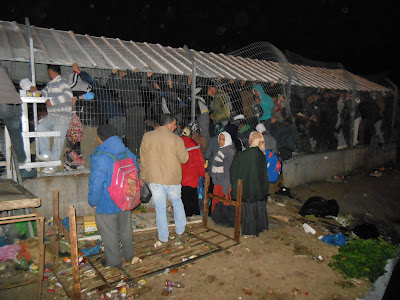It recently occurred to me that my vocabulary has expanded
considerably since I’ve been on this journey.
No, I haven’t learned much Arabic – the new words are more what I
call “the vocabulary of the Occupation.”
I’m assuming that some readers of this blog have heard at
least some of the terms I’ve been using (“Settlements,” “Wall,” “Home
Demolition,” etc.); it is my hope to expand on at least some of them as I
continue to post from the West Bank for the next couple of months.
 |
| Climbing into the Tayba checkpoint at 5:00 am |
Recently, on “checkpoint duty” at Tayba, it occurred to me
that many people who have heard this term have no idea of what “checkpoint”
really means. After all, we go through
“checkpoints” of a sort, every time we fly.
We take off our shoes, we put our belongings and our persons through
metal detectors and we wait patiently in line for the privilege of these
inspections.
Well, if you are looking at the photos that accompany this
post, you may well conclude that, here in the West Bank, “checkpoints” are very
different – and much more severe than anything Western travelers could begin to
imagine.
 |
| Trash fire keeps women warm while waiting for opening |
When you are flying, the advice is to get there an hour
before departure – two for an international flight. Here, people will leave their homes at 2 in
the morning to be near the head of the line at the checkpoint when it opens at
4 am. With luck, they will be through by
5:00, and ready to get to their jobs to start work at 6.
And the orderly queue you are used
to at the airport? Forget it! Here, men will push and shove, even climbing
over torn parts of the fence to move forward before the gate closes – often
arbitrarily – making them wait again.
Chivalry is not dead though – women are always allowed to move to the
front, and are not a part of the general melee that often ensues as 5,000 men
fight to get through the checkpoint and on to the waiting vehicles that their
employees send. And if they aren’t
there, the transportation goes without them – and so does a day’s pay?
 | |
| "Why do people subject themselves to this?" |
“Why do people subject themselves
to this,” you may well ask? “Why cross
to Israel to work?” Well, like the
answers to many questions – anywhere in the world – the answer boils down to,
“It’s the economy.”
Basically there are virtually no
jobs in Palestine. Most of the workers
are college-educated, many with advanced degrees (The Palestinian people are
considered the “best educated” in the Middle East!). Still, with hundreds of applicants for every
job that requires a college education, most have to settle for low-paying,
menial, labor just to support their families.
And those menial jobs – construction, gardening, household help – are
more plentiful and pay better in Israel than in Palestine.
 |
| In a "normal" day at Tayba checkpoint, more than 5,000 people will go through between 4:00 and 6:30 am. |
So, look at these photos and try
to imagine having to go through ordeal this five or six mornings a week – just
to put food on your table and a roof over your head! Those of us working here all want the
Occupation to end :the Wall to come down – but, if the Israelis won’t do
that, couldn’t they at least come up with a more humane way to treat the people
whose land they continue to occupy?
No comments:
Post a Comment